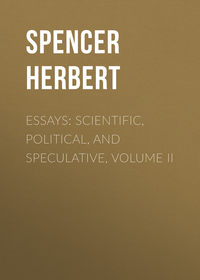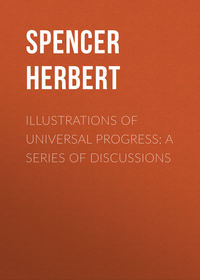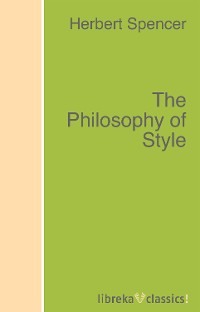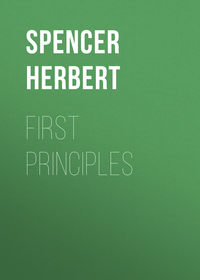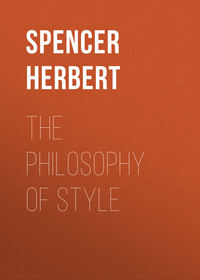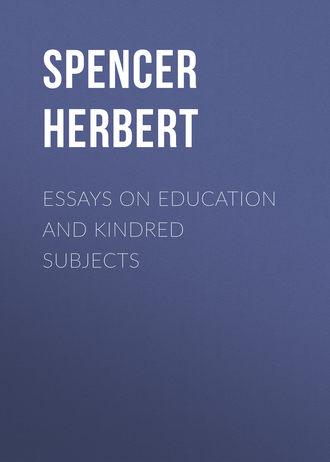 полная версия
полная версияEssays on Education and Kindred Subjects
Thus, to all such as are occupied in the production, exchange, or distribution of commodities, acquaintance with Science in some of its departments, is of fundamental importance. Each man who is immediately or remotely implicated in any form of industry (and few are not) has in some way to deal with the mathematical, physical, and chemical properties of things; perhaps, also, has a direct interest in biology; and certainly has in sociology. Whether he does or does not succeed well in that indirect self-preservation which we call getting a good livelihood, depends in a great degree on his knowledge of one or more of these sciences: not, it may be, a rational knowledge; but still a knowledge, though empirical. For what we call learning a business, really implies learning the science involved in it; though not perhaps under the name of science. And hence a grounding in science is of great importance, both because it prepares for all this, and because rational knowledge has an immense superiority over empirical knowledge. Moreover, not only is scientific culture requisite for each, that he may understand the how and the why of the things and processes with which he is concerned as maker or distributor; but it is often of much moment that he should understand the how and the why of various other things and processes. In this age of joint-stock undertakings, nearly every man above the labourer is interested as capitalist in some other occupation than his own; and, as thus interested, his profit or loss often depends on his knowledge of the sciences bearing on this other occupation. Here is a mine, in the sinking of which many shareholders ruined themselves, from not knowing that a certain fossil belonged to the old red sandstone, below which no coal is found. Numerous attempts have been made to construct electromagnetic engines, in the hope of superseding steam; but had those who supplied the money understood the general law of the correlation and equivalence of forces, they might have had better balances at their bankers. Daily are men induced to aid in carrying out inventions which a mere tyro in science could show to be futile. Scarcely a locality but has its history of fortunes thrown away over some impossible project.
And if already the loss from want of science is so frequent and so great, still greater and more frequent will it be to those who hereafter lack science. Just as fast as productive processes become more scientific, which competition will inevitably make them do; and just as fast as joint-stock undertakings spread, which they certainly will; so fast must scientific knowledge grow necessary to every one.
That which our school-courses leave almost entirely out, we thus find to be that which most nearly concerns the business of life. Our industries would cease, were it not for the information which men begin to acquire, as they best may, after their education is said to be finished. And were it not for this information, from age to age accumulated and spread by unofficial means, these industries would never have existed. Had there been no teaching but such as goes on in our public schools, England would now be what it was in feudal times. That increasing acquaintance with the laws of phenomena, which has through successive ages enabled us to subjugate Nature to our needs, and in these days gives the common labourer comforts which a few centuries ago kings could not purchase, is scarcely in any degree owed to the appointed means of instructing our youth. The vital knowledge – that by which we have grown as a nation to what we are, and which now underlies our whole existence, is a knowledge that has got itself taught in nooks and corners; while the ordained agencies for teaching have been mumbling little else but dead formulas.
We come now to the third great division of human activities – a division for which no preparation whatever is made. If by some strange chance not a vestige of us descended to the remote future save a pile of our school-books or some college examination papers, we may imagine how puzzled an antiquary of the period would be on finding in them no sign that the learners were ever likely to be parents. "This must have been the curriculum for their celibates," we may fancy him concluding. "I perceive here an elaborate preparation for many things; especially for reading the books of extinct nations and of co-existing nations (from which indeed it seems clear that these people had very little worth reading in their own tongue); but I find no reference whatever to the bringing up of children. They could not have been so absurd as to omit all training for this gravest of responsibilities. Evidently then, this was the school-course of one of their monastic orders."
Seriously, is it not an astonishing fact, that though on the treatment of offspring depend their lives or deaths, and their moral welfare or ruin; yet not one word of instruction on the treatment of offspring is ever given to those who will by and by be parents? Is it not monstrous that the fate of a new generation should be left to the chances of unreasoning custom, impulse, fancy – joined with the suggestions of ignorant nurses and the prejudiced counsel of grandmothers? If a merchant commenced business without any knowledge of arithmetic and book-keeping, we should exclaim at his folly, and look for disastrous consequences. Or if, before studying anatomy, a man set up as a surgical operator, we should wonder at his audacity and pity his patients. But that parents should begin the difficult task of rearing children, without ever having given a thought to the principles – physical, moral, or intellectual – which ought to guide them, excites neither surprise at the actors nor pity for their victims.
To tens of thousands that are killed, add hundreds of thousand that survive with feeble constitutions, and millions that grow up with constitutions not so strong as they should be; and you will have some idea of the curse inflicted on their offspring by parents ignorant of the laws of life. Do but consider for a moment that the regimen to which children are subject, is hourly telling upon them to their life-long injury or benefit; and that there are twenty ways of going wrong to one way of going right; and you will get some idea of the enormous mischief that is almost everywhere inflicted by the thoughtless, haphazard system in common use. Is it decided that a boy shall be clothed in some flimsy short dress, and be allowed to go playing about with limbs reddened by cold? The decision will tell on his whole future existence – either in illnesses; or in stunted growth; or in deficient energy; or in a maturity less vigorous than it ought to have been, and in consequent hindrances to success and happiness. Are children doomed to a monotonous dietary, or a dietary that is deficient in nutritiveness? Their ultimate physical power, and their efficiency as men and women, will inevitably be more or less diminished by it. Are they forbidden vociferous play, or (being too ill-clothed to bear exposure) are they kept indoors in cold weather? They are certain to fall below that measure of health and strength to which they would else have attained. When sons and daughters grow up sickly and feeble, parents commonly regard the event as a misfortune – as a visitation of Providence. Thinking after the prevalent chaotic fashion, they assume that these evils come without causes; or that the causes are supernatural. Nothing of the kind. In some cases the causes are doubtless inherited; but in most cases foolish regulations are the causes. Very generally, parents themselves are responsible for all this pain, this debility, this depression, this misery. They have undertaken to control the lives of their offspring from hour to hour; with cruel carelessness they have neglected to learn anything about these vital processes which they are unceasingly affecting by their commands and prohibitions; in utter ignorance of the simplest physiologic laws, they have been year by year undermining the constitutions of their children; and have so inflicted disease and premature death, not only on them but on their descendants.
Equally great are the ignorance and the consequent injury, when we turn from physical training to moral training. Consider the young mother and her nursery-legislation. But a few years ago she was at school, where her memory was crammed with words, and names, and dates, and her reflective faculties scarcely in the slightest degree exercised – where not one idea was given her respecting the methods of dealing with the opening mind of childhood; and where her discipline did not in the least fit her for thinking out methods of her own. The intervening years have been passed in practising music, in fancy-work, in novel-reading, and in party-going: no thought having yet been given to the grave responsibilities of maternity; and scarcely any of that solid intellectual culture obtained which would be some preparation for such responsibilities. And now see her with an unfolding human character committed to her charge – see her profoundly ignorant of the phenomena with which she has to deal, undertaking to do that which can be done but imperfectly even with the aid of the profoundest knowledge. She knows nothing about the nature of the emotions, their order of evolution, their functions, or where use ends and abuse begins. She is under the impression that some of the feelings are wholly bad, which is not true of any one of them; and that others are good however far they may be carried, which is also not true of any one of them. And then, ignorant as she is of the structure she has to deal with, she is equally ignorant of the effects produced on it by this or that treatment. What can be more inevitable than the disastrous results we see hourly arising? Lacking knowledge of mental phenomena, with their cause and consequences, her interference is frequently more mischievous than absolute passivity would have been. This and that kind of action, which are quite normal and beneficial, she perpetually thwarts; and so diminishes the child's happiness and profit, injures its temper and her own, and produces estrangement. Deeds which she thinks it desirable to encourage, she gets performed by threats and bribes, or by exciting a desire for applause: considering little what the inward motive may be, so long as the outward conduct conforms; and thus cultivating hypocrisy, and fear, and selfishness, in place of good feeling. While insisting on truthfulness, she constantly sets an example of untruth by threatening penalties which she does not inflict. While inculcating self-control, she hourly visits on her little ones angry scoldings for acts undeserving of them. She has not the remotest idea that in the nursery, as in the world, that alone is the truly salutary discipline which visits on all conduct, good and bad, the natural consequences – the consequences, pleasurable or painful, which in the nature of things such conduct tends to bring. Being thus without theoretic guidance, and quite incapable of guiding herself by tracing the mental processes going on in her children, her rule is impulsive, inconsistent, mischievous; and would indeed be generally ruinous were it not that the overwhelming tendency of the growing mind to assume the moral type of the race usually subordinates all minor influences.
And then the culture of the intellect – is not this, too, mismanaged in a similar manner? Grant that the phenomena of intelligence conform to laws; grant that the evolution of intelligence in a child also conforms to laws; and it follows inevitably that education cannot be rightly guided without a knowledge of these laws. To suppose that you can properly regulate this process of forming and accumulating ideas, without understanding the nature of the process, is absurd. How widely, then, must teaching as it is differ from teaching as it should be; when hardly any parents, and but few tutors, know anything about psychology. As might be expected, the established system is grievously at fault, alike in matter and in manner. While the right class of facts is withheld, the wrong class is forcibly administered in the wrong way and in the wrong order. Under that common limited idea of education which confines it to knowledge gained from books, parents thrust primers into the hands of their little ones years too soon, to their great injury. Not recognising the truth that the function of books is supplementary – that they form an indirect means to knowledge when direct means fail – a means of seeing through other men what you cannot see for yourself; teachers are eager to give second-hand facts in place of first-hand facts. Not perceiving the enormous value of that spontaneous education which goes on in early years – not perceiving that a child's restless observation, instead of being ignored or checked, should be diligently ministered to, and made as accurate and complete as possible; they insist on occupying its eyes and thoughts with things that are, for the time being, incomprehensible and repugnant. Possessed by a superstition which worships the symbols of knowledge instead of the knowledge itself, they do not see that only when his acquaintance with the objects and processes of the household, the streets, and the fields, is becoming tolerably exhaustive – only then should a child be introduced to the new sources of information which books supply: and this, not only because immediate cognition is of far greater value than mediate cognition; but also, because the words contained in books can be rightly interpreted into ideas, only in proportion to the antecedent experience of things. Observe next, that this formal instruction, far too soon commenced, is carried on with but little reference to the laws of mental development. Intellectual progress is of necessity from the concrete to the abstract. But regardless of this, highly abstract studies, such as grammar, which should come quite late, are begun quite early. Political geography, dead and uninteresting to a child, and which should be an appendage of sociological studies, is commenced betimes; while physical geography, comprehensible and comparatively attractive to a child, is in great part passed over. Nearly every subject dealt with is arranged in abnormal order: definitions and rules and principles being put first, instead of being disclosed, as they are in the order of nature, through the study of cases. And then, pervading the whole, is the vicious system of rote learning – a system of sacrificing the spirit to the letter. See the results. What with perceptions unnaturally dulled by early thwarting, and a coerced attention to books – what with the mental confusion produced by teaching subjects before they can be understood, and in each of them giving generalisations before the facts of which they are the generalisations – what with making the pupil a mere passive recipient of other's ideas, and not in the least leading him to be an active inquirer or self-instructor – and what with taxing the faculties to excess; there are very few minds that become as efficient as they might be. Examinations being once passed, books are laid aside; the greater part of what has been acquired, being unorganised, soon drops out of recollection; what remains is mostly inert – the art of applying knowledge not having been cultivated; and there is but little power either of accurate observation or independent thinking. To all which add, that while much of the information gained is of relatively small value, an immense mass of information of transcendent value is entirely passed over.
Thus we find the facts to be such as might have been inferred à priori. The training of children – physical, moral, and intellectual – is dreadfully defective. And in great measure it is so because parents are devoid of that knowledge by which this training can alone be rightly guided. What is to be expected when one of the most intricate of problems is undertaken by those who have given scarcely a thought to the principles on which its solution depends? For shoe-making or house-building, for the management of a ship or a locomotive engine, a long apprenticeship is needful. Is it, then, that the unfolding of a human being in body and mind is so comparatively simple a process that any one may superintend and regulate it with no preparation whatever? If not – if the process is, with one exception, more complex than any in Nature, and the task of ministering to it one of surpassing difficulty; is it not madness to make no provision for such a task? Better sacrifice accomplishments than omit this all-essential instruction. When a father, acting on false dogmas adopted without examination, has alienated his sons, driven them into rebellion by his harsh treatment, ruined them, and made himself miserable; he might reflect that the study of Ethology would have been worth pursuing, even at the cost of knowing nothing about Æschylus. When a mother is mourning over a first-born that has sunk under the sequelæ of scarlet-fever – when perhaps a candid medical man has confirmed her suspicion that her child would have recovered had not its system been enfeebled by over-study – when she is prostrate under the pangs of combined grief and remorse; it is but a small consolation that she can read Dante in the original.
Thus we see that for regulating the third great division of human activities, a knowledge of the laws of life is the one thing needful. Some acquaintance with the first principles of physiology and the elementary truths of psychology, is indispensable for the right bringing up of children. We doubt not that many will read this assertion with a smile. That parents in general should be expected to acquire a knowledge of subjects so abstruse will seem to them an absurdity. And if we proposed that an exhaustive knowledge of these subjects should be obtained by all fathers and mothers, the absurdity would indeed be glaring enough. But we do not. General principles only, accompanied by such illustrations as may be needed to make them understood, would suffice. And these might be readily taught – if not rationally, then dogmatically. Be this as it may, however, here are the indisputable facts: – that the development of children in mind and body follows certain laws; that unless these laws are in some degree conformed to by parents, death is inevitable; that unless they are in a great degree conformed to, there must result serious physical and mental defects; and that only when they are completely conformed to, can a perfect maturity be reached. Judge, then, whether all who may one day be parents, should not strive with some anxiety to learn what these laws are.
From the parental functions let us pass now to the functions of the citizen. We have here to inquire what knowledge fits a man for the discharge of these functions. It cannot be alleged that the need for knowledge fitting him for these functions is wholly overlooked; for our school-courses contain certain studies, which, nominally at least, bear upon political and social duties. Of these the only one that occupies a prominent place is History.
But, as already hinted, the information commonly given under this head, is almost valueless for purposes of guidance. Scarcely any of the facts set down in our school-histories, and very few of those contained in the more elaborate works written for adults, illustrate the right principles of political action. The biographies of monarchs (and our children learn little else) throw scarcely any light upon the science of society. Familiarity with court intrigues, plots, usurpations, or the like, and with all the personalities accompanying them, aids very little in elucidating the causes of national progress. We read of some squabble for power, that it led to a pitched battle; that such and such were the names of the generals and their leading subordinates; that they had each so many thousand infantry and cavalry, and so many cannon; that they arranged their forces in this and that order; that they manœuvred, attacked, and fell back in certain ways; that at this part of the day such disasters were sustained, and at that such advantages gained; that in one particular movement some leading officer fell, while in another a certain regiment was decimated; that after all the changing fortunes of the fight, the victory was gained by this or that army; and that so many were killed and wounded on each side, and so many captured by the conquerors. And now, out of the accumulated details making up the narrative, say which it is that helps you in deciding on your conduct as a citizen. Supposing even that you had diligently read, not only The Fifteen Decisive Battles of the World, but accounts of all other battles that history mentions; how much more judicious would your vote be at the next election? "But these are facts – interesting facts," you say. Without doubt they are facts (such, at least, as are not wholly or partially fictions); and to many they may be interesting facts. But this by no means implies that they are valuable. Factitious or morbid opinion often gives seeming value to things that have scarcely any. A tulipomaniac will not part with a choice bulb for its weight in gold. To another man an ugly piece of cracked old china seems his most desirable possession. And there are those who give high prices for the relics of celebrated murderers. Will it be contended that these tastes are any measures of value in the things that gratify them? If not, then it must be admitted that the liking felt for certain classes of historical facts is no proof of their worth; and that we must test their worth, as we test the worth of other facts, by asking to what uses they are applicable. Were some one to tell you that your neighbour's cat kittened yesterday, you would say the information was valueless. Fact though it might be, you would call it an utterly useless fact – a fact that could in no way influence your actions in life – a fact that would not help you in learning how to live completely. Well, apply the same test to the great mass of historical facts, and you will get the same result. They are facts from which no conclusions can be drawn —unorganisable facts; and therefore facts of no service in establishing principles of conduct, which is the chief use of facts. Read them, if you like, for amusement; but do not flatter your self they are instructive.
That which constitutes History, properly so called, is in great part omitted from works on the subject. Only of late years have historians commenced giving us, in any considerable quantity, the truly valuable information. As in past ages the king was everything and the people nothing; so, in past histories the doings of the king fill the entire picture, to which the national life forms but an obscure background. While only now, when the welfare of nations rather than of rulers is becoming the dominant idea, are historians beginning to occupy themselves with the phenomena of social progress. The thing it really concerns us to know is the natural history of society. We want all facts which help us to understand how a nation has grown and organised itself. Among these, let us of course have an account of its government; with as little as may be of gossip about the men who officered it, and as much as possible about the structure, principles, methods, prejudices, corruptions, etc., which it exhibited: and let this account include not only the nature and actions of the central government, but also those of local governments, down to their minutest ramifications. Let us of course also have a parallel description of the ecclesiastical government – its organisation, its conduct, its power, its relations to the State; and accompanying this, the ceremonial, creed, and religious ideas – not only those nominally believed, but those really believed and acted upon. Let us at the same time be informed of the control exercised by class over class, as displayed in social observances – in titles, salutations, and forms of address. Let us know, too, what were all the other customs which regulated the popular life out of doors and in-doors: including those concerning the relations of the sexes, and the relations of parents to children. The superstitions, also, from the more important myths down to the charms in common use, should be indicated. Next should come a delineation of the industrial system: showing to what extent the division of labour was carried; how trades were regulated, whether by caste, guilds, or otherwise; what was the connection between employers and employed; what were the agencies for distributing commodities; what were the means of communication; what was the circulating medium. Accompanying all which should be given an account of the industrial arts technically considered: stating the processes in use, and the quality of the products. Further, the intellectual condition of the nation in its various grades should be depicted; not only with respect to the kind and amount of education, but with respect to the progress made in science, and the prevailing manner of thinking. The degree of æsthetic culture, as displayed in architecture, sculpture, painting, dress, music, poetry, and fiction, should be described. Nor should there be omitted a sketch of the daily lives of the people – their food, their homes, and their amusements. And lastly, to connect the whole, should be exhibited the morals, theoretical and practical, of all classes: as indicated in their laws, habits, proverbs, deeds. These facts, given with as much brevity as consists with clearness and accuracy, should be so grouped and arranged that they may be comprehended in their ensemble, and contemplated as mutually-dependent parts of one great whole. The aim should be so to present them that men may readily trace the consensus subsisting among them; with the view of learning what social phenomena co-exist with what other. And then the corresponding delineations of succeeding ages should be so managed as to show how each belief, institution, custom, and arrangement was modified; and how the consensus of preceding structures and functions was developed into the consensus of succeeding ones. Such alone is the kind of information respecting past times which can be of service to the citizen for the regulation of his conduct. The only history that is of practical value is what may be called Descriptive Sociology. And the highest office which the historian can discharge, is that of so narrating the lives of nations, as to furnish materials for a Comparative Sociology; and for the subsequent determination of the ultimate laws to which social phenomena conform.


